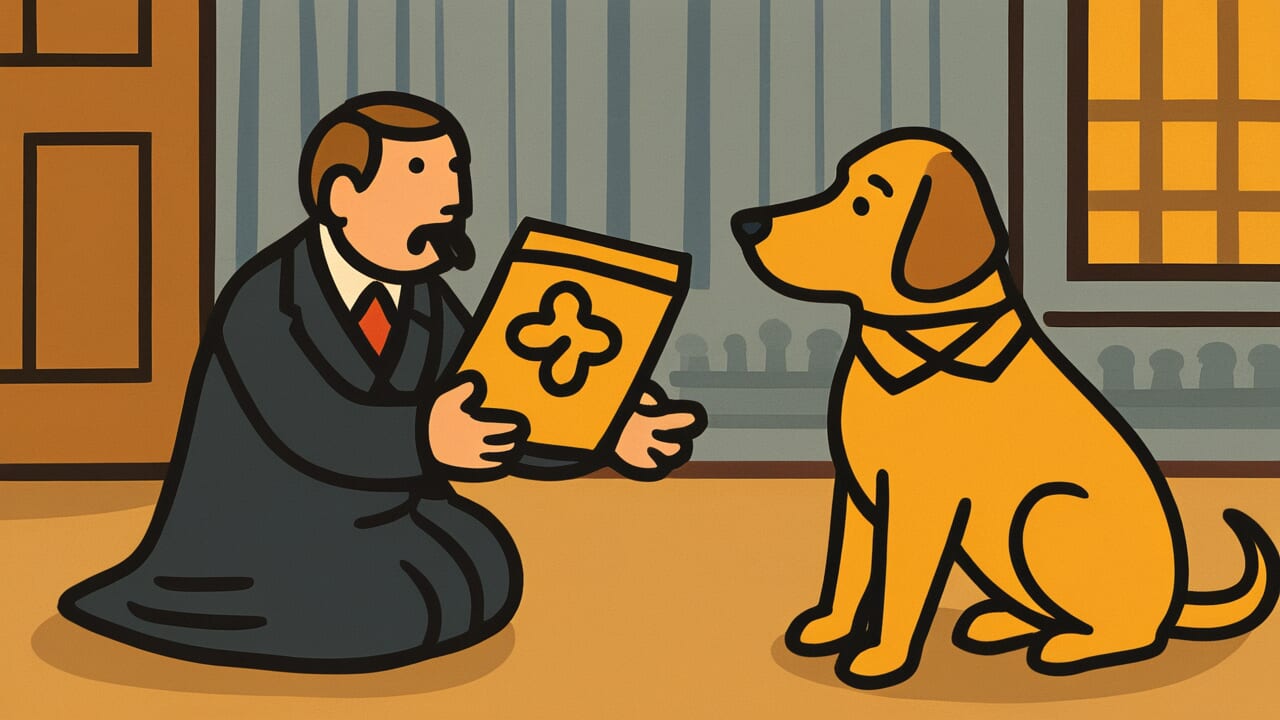How to Read “Bitten by the lord’s dog for nothing”
Tono no inu ni wa kuware-zon
Meaning of “Bitten by the lord’s dog for nothing”
“Bitten by the lord’s dog for nothing” means you have to suffer in silence even when harmed by someone powerful.
This proverb describes situations where you receive unfair treatment or suffer damage from powerful people or their associates.
Because of your weak position, you can’t complain or demand compensation. Even something as trivial as the lord’s dog can harm you without consequences.
The power behind that dog protects it, leaving victims unable to speak up.
People use this proverb when lamenting the injustice of being unable to make legitimate claims due to power imbalances.
Even today, it applies when individuals face unfair treatment in situations with huge power differences. Think of large corporations versus individuals, or bosses versus employees.
The phrase carries feelings of resignation and helplessness. It captures the frustration of knowing you’re right but having no chance of being heard or winning.
Origin and Etymology
No specific written source marks the first use of this proverb. However, it likely emerged during the Edo period when Japan’s class system was extremely rigid.
“Tono” refers to powerful figures like feudal lords who governed regions. “The lord’s dog” literally means a dog owned by such a lord.
In Edo-period samurai society, keeping dogs was common. But dogs owned by powerful people held special status.
Under the strict class system of that time, common people couldn’t file complaints even if a lord’s dog bit and injured them.
Since the dog’s owner held power, complaining could actually result in punishment for the victim. Even something as minor as being harmed by an animal meant suffering in silence before power.
This expression reveals the unjust social structure of that era.
The proverb’s background suggests such incidents actually occurred with some frequency. When powerful people’s property or associates caused harm, those with weak positions had no voice.
This reality became fixed in language through the concrete, easy-to-understand metaphor of “being bitten by a dog.”
Usage Examples
- Not being able to refuse unreasonable demands from clients is exactly like being bitten by the lord’s dog for nothing
- When individuals sue major corporations, the reality is it often ends up as bitten by the lord’s dog for nothing
Universal Wisdom
“Bitten by the lord’s dog for nothing” has been passed down through generations because our ancestors keenly understood a constant reality in human society: the imbalance of power.
In every era and every society, an insurmountable wall exists between those who hold power and those who don’t.
Sadly, situations where power trumps justice and reason continue endlessly, both past and present. This proverb has given voice to the frustration of people facing such injustice.
What’s interesting is that this proverb isn’t simply a word of resignation. Rather, by putting injustice into words, people have organized their emotions, found empathy, and sometimes united.
Saying “bitten by the lord’s dog for nothing” confirms that your sense of being treated unfairly isn’t wrong.
Humans instinctively seek fairness. That’s why unfair situations cause such strong discomfort.
This proverb was born and continues to be used because universal anger and sadness about injustice through power persists in people’s hearts across time.
When AI Hears This
Analyzing this situation of having to suffer in silence after being bitten by a powerful person’s dog through game theory reveals a surprising structure.
This is an extreme form of the “principal-agent problem.”
In normal negotiations, if someone breaks a promise, you can sue them or damage their reputation. In other words, you have “retaliation options.”
But when dealing with a powerful person’s property, this retaliation mechanism completely fails. If you complain to the lord who owns the dog, you risk being punished yourself.
In game theory, the negotiating power of the side that cannot retaliate theoretically becomes zero.
Even more serious is information asymmetry. The lord knows “the dog bit someone” but has no incentive to acknowledge it.
Even if victims present evidence, they can’t argue back when told “it was your fault.” This phenomenon, called “adverse selection,” gives one-sided advantage to those holding information.
Most interesting about this structure is that being closer to power actually increases your probability of loss.
Castle town residents encounter the lord’s dog more often, raising their risk of harm. Yet their proximity makes retaliation more dangerous.
Game theory calls this “proximity paradox where closeness increases risk” a power paradox. This proverb accurately captures the hidden cost of being near power.
Lessons for Today
What this proverb teaches modern people is that when facing unjust situations, you shouldn’t just accept them as “unavoidable.”
True, standing up to opponents with power differences isn’t easy. But modern society has weapons our ancestors lacked.
Legal protections, labor unions, consumer groups, and information sharing through social media have dramatically increased the means for individuals to raise their voices.
The key is not to bear it alone. When people in similar positions unite, small voices become great power.
Also, keeping records and consulting experts can open paths to avoid suffering in silence.
At the same time, this proverb asks us a question. Might you yourself be someone’s “lord”?
When you gain higher positions, are you unconsciously putting others in a state of “bitten for nothing”? We should maintain the humility to reflect on this.
Those who know injustice can become the builders of a fair society.



Comments